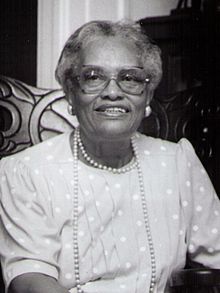Dovey Johnson Roundtree | |
|---|---|
 Roundtree pictured in Charlotte, North Carolina in 1994 | |
| Born | Dovey Mae Johnson April 17, 1914 |
| Died | May 21, 2018 (aged 104) Charlotte, North Carolina, U.S. |
| Alma mater | Spelman College Howard University School of Law |
| Occupation(s) | Civil rights and criminal defense lawyer, minister, Army veteran |
| Years active | 1951–1996 |
| Known for | Co-Counsel for the petitioner in Sarah Keys v. Carolina Coach Company (64 MCC 769 (1955) First black member of DC Women's Bar American Bar Association 2000 Margaret Brent Award winner |
| Spouse | William Roundtree (1946-1947; divorced) |
| Website | doveyjohnsonroundtree |
Dovey Mae Johnson Roundtree (April 17, 1914 – May 21, 2018) was an African-American civil rights activist, ordained minister, and attorney. Her 1955 victory before the Interstate Commerce Commission in the first bus desegregation case to be brought before the ICC resulted in the only explicit repudiation of the "separate but equal" doctrine in the field of interstate bus transportation by a court or federal administrative body.[1] That case, Sarah Keys v. Carolina Coach Company (64 MCC 769 (1955)), which Dovey Roundtree brought before the ICC with her law partner and mentor Julius Winfield Robertson, was invoked by Attorney General Robert F. Kennedy during the 1961 Freedom Riders' campaign in his successful battle to compel the Interstate Commerce Commission to enforce its rulings and end Jim Crow laws in public transportation.[2]
A protégé of black activist and educator Mary McLeod Bethune, Roundtree was selected by Bethune for the first class of African-American women to be trained as officers in the newly created Women's Army Auxiliary Corps (later the Women's Army Corps)[3] during World War II. In 1961 she became one of the first women to receive full ministerial status in the African Methodist Episcopal Church, which had just begun ordaining women at a level beyond mere preachers in 1960.[4] With her controversial admission to the all-white Women's Bar of the District of Columbia in 1962, she broke the color bar for minority women in the Washington legal community.[5] In one of Washington's most sensational and widely covered murder cases, United States v. Ray Crump, tried in the summer of 1965 on the eve of the Watts riots, Roundtree won acquittal for the black laborer accused of the murder of Georgetown socialite (and former wife of a CIA officer) Mary Pinchot Meyer,[6] a woman with romantic ties to President John F. Kennedy.[7]
The founding partner of the Washington, D.C. law firm of Roundtree, Knox, Hunter and Parker in 1970 following the death of her first law partner Julius Robertson in 1961, Roundtree was special consultant for legal affairs to the AME Church, and General Counsel to the National Council of Negro Women.[8] She was the inspiration for actress Cicely Tyson's depiction of a maverick civil rights lawyer in the television series "Sweet Justice",[9] and the recipient, along with retired Supreme Court Justice Sandra Day O'Connor, of the American Bar Association's 2000 Margaret Brent Women Lawyers of Achievement Award.[10]
- ^ Barnes, Journey From Jim Crow, p. 99.
- ^ "Petition for Rule-Making Filed by Attorney General on Behalf of the United States," ICC Docket No. MC-C-3358, May 29, 1961.
- ^ Putney, When the Nation Was In Need, pp. 29–30.
- ^ Greason, Walter David, The A.M.E. Church Review, pp. 45-55.
- ^ Green, Joyce Hens, Oral History, Second Interview, September 16, 1999, pp. 65-67.
- ^ Chapman, William, "Crump Free in Murder on Towpath," The Washington Post, July 31, 1965, p. A1.
- ^ Bradlee, A Good Life, pp. 267-268.
- ^ Warner, Honorable John, Congressional Record, April 13, 2000.
- ^ Weinraub, Judith, "A Long Life of Sweet Justice", The Washington Post, February 4, 1995.
- ^ "Previous Margaret Brent Women Lawyers of Achievement Award Recipients - Commission on Women in the Profession". www.abanet.org. Archived from the original on December 3, 2010. Retrieved May 23, 2018.